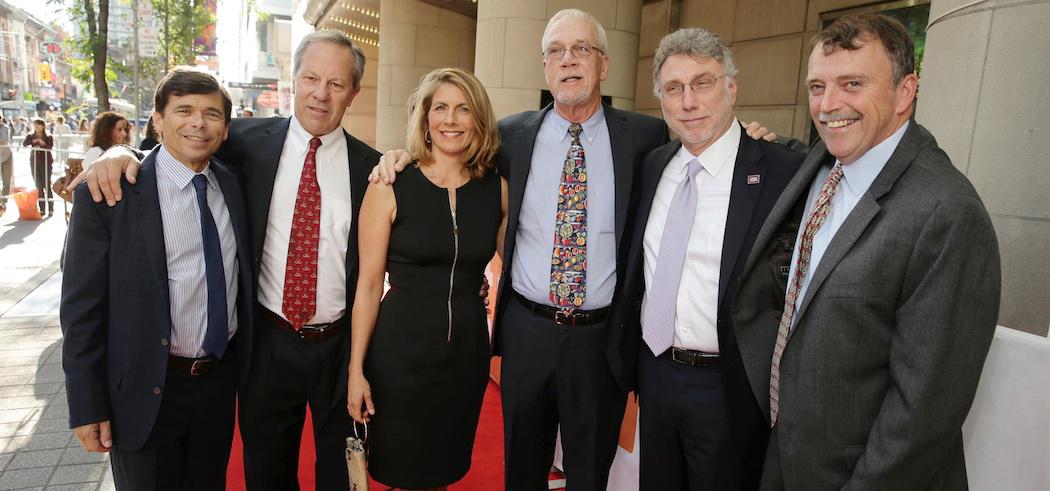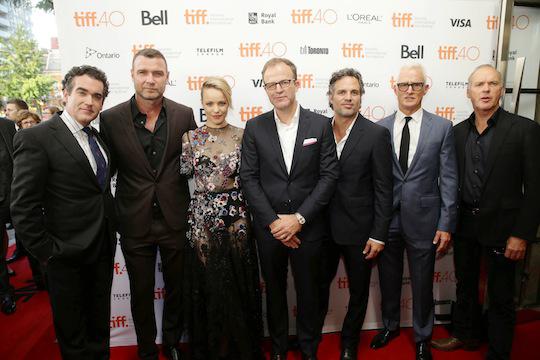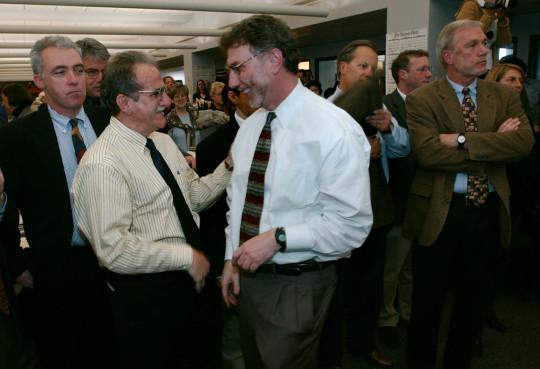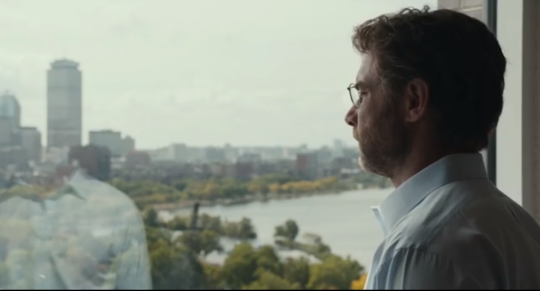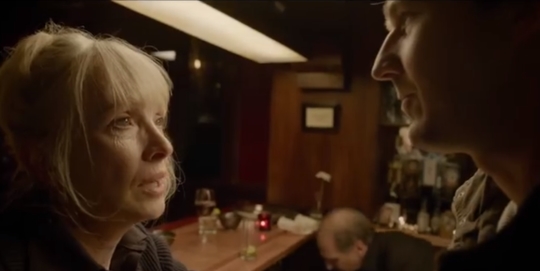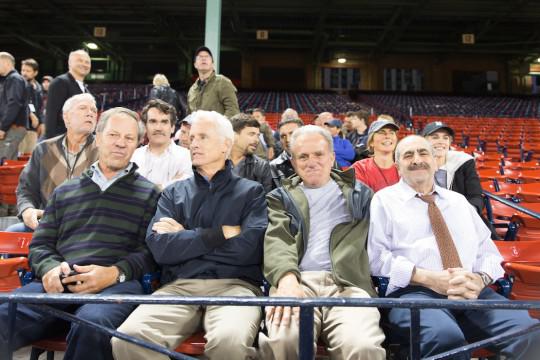|
Spotlight’ — A Morality Tale For Our Cynical Times
By Ed Siegel
[with video] For many people, going to the movies is a way of stepping outside their world and into another. Sometimes it’s a fantasy world — all too prevalent in Hollywood’s adolescent mindset these days. Sometimes, as with “Steve Jobs,” it’s a hyper-realistic attempt to create a new mythology that may or may not have much to do with the truth. The great film “Spotlight” is something else, particularly for someone who worked at the Boston Globe for 35 years. I spent two hours trying to figure out if I was in a movie theater or back on Morrissey Boulevard, home of the Globe and where some of the scenes were shot. I should say upfront that I had absolutely nothing to do with the real Spotlight series on Boston priests preying on their charges and the archdiocese’s cover-ups. As the amazing piece of investigative journalism was getting ready to roll out, I was charting the great leap forward in Boston’s small and midsize theaters in 2001 as the paper’s theater critic. And I thought I was working on a big local story. Still, I knew all the principals. Rachel McAdams turned my wife and me on to Moulton’s, an excellent little seafood restaurant in our Medford neighborhood. I mean, Sacha Pfeiffer. It’s easy to confuse the two. And that’s what made watching “Spotlight” such an uncanny experience even though the only uncanny thing within the movie was wondering how men of God could have tolerated such Satanic doings by the clergy who reported to them. But McAdams, Michael Keaton (Walter Robinson, the head of the team) and Liev Schreiber (Marty Baron, the editor of the paper) set out to imitate the characters they were playing and did it with such skill and finesse that I can’t think of one without thinking of the other anymore. The other actors, not so much. I don’t know that John Slattery, who plays Ben Bradlee Jr., is capable of playing anyone other than Roger Sterling in “Mad Men,” though he plays that part to perfection. Slattery/Sterling is not the bulldog that Bradlee was. And the ever-affable Steve Kurkjian could sue Gene Amoroso for defamation of character. He could also sue the filmmakers. Kurkjian is a terrific investigative reporter, one of the best in the business, who was eventually part of the Pulitzer-winning team — the exact opposite of the curmudgeonly hack he’s made out to be in the movie. Click here to see what current editor Brian McGrory had to say about Kurkjian. Kurkjian aside, it’s the realism, and the accuracy, of the movie that got me. Beyond the imitation of the characters, it is a remarkable look at the inner workings of a newspaper. The morning meetings, the wiseass camaraderie, the arguments over decisions and policies. Writers Tom McCarthy and Josh Singer did their homework. Beyond impersonation, Schreiber captures Baron the outsider beautifully. He was the first editor there who wasn’t known to the majority of folks in the newsroom. Was his Judaism an issue in a long line of WASP and Irish editors? Probably less than the movie makes it out to be as the Globe had become an increasingly polyglot place, but that issue is something of a Rorschach test. Personally, I think the Globe would have eventually gotten the story without Baron, but there’s no question that his persistence and his questioning why the courts had sealed the records about a predator priest were the turning points in the investigation. That the filmmakers get most of the little things right only underlines that they got the big story right, too. “Spotlight” is a heroic story in an unheroic time — a time in which hyper-irony, political polarization and relativism are the currency of the day. As Mark Edmundson writes in his new book, “Self and Soul,” “Nothing is in worse repute [today] than the ideal.” As a critic I usually find myself in the camp that favors moral ambiguity over moral certitude. I love “Breaking Bad,” the novels of Patricia Highsmith, modernist unheroic music. The creators of “Spotlight” pay attention to a certain relativism themselves — how it’s easy for all of us to go along or to just look the other way. There’s a very powerful scene in the movie about that. It’s a human failing and journalists are human, though you might not guess that from the way that we are often portrayed. To Republicans, we are part of a liberal elite, the scourge of all that’s great about America. To lefties we are part of a corporate elite that couldn’t care less about the truth. To filmmakers we are soul-crushing narcissists — witness the ludicrous portrayal of a New York Times theater critic (gulp) as a besotted, vengeful creep in “Birdman.” And, of course, there’s the reality of journalistic scandal after journalistic scandal beginning with Janet Cooke’s fraudulent reporting for the Washington Post in the early 1980s. Except for Alejandro González Iñárritu’s “Birdman,” critiques of journalists are as valid as journalists’ critiques of others. (Michael Keaton, ironically, was on the opposite side of the journalistic fence in “Birdman” from where he is in “Spotlight” and “The Paper.”)To me, though, “Spotlight” is the accurate portrayal of journalists at work, and I should reiterate that I don’t have any dogs in this specific hunt, having left the Globe in 2006. For all the black humor that journalists enjoy summoning up at every available opportunity, “Spotlight” is a reminder that good and evil, truth and lies do exist in the world and that journalists, whatever sins of omission and commission along the way, come out on the positive side of the equation. Not always, and certainly not without a kick in the keister from time to time, but “Spotlight” made me incredibly proud of my profession. So thank you, “Spotlight.” Yes, I loved seeing Hollywood actors play people I know. I loved seeing the real reporters sporting cameos at Fenway Park and in the Globe newsroom. And I loved seeing my old haunts brought to life so vividly and realistically, along with other Boston scenes. It’s an infinitely smarter portrayal of the city than Ben Affleck’s wildly overrated Boston-based movies. Boston can be a remarkably parochial city. But more than anything else, I loved “Spotlight” for so passionately reminding me why I went into this business in the first place.
|
.
Any original material on these pages is copyright © BishopAccountability.org 2004. Reproduce freely with attribution.
